National Identity vs Global Citizenship
VerifiedAdded on 2020/10/05
|9
|2597
|51
AI Summary
The given assignment delves into the distinction between national identity and global citizenship, highlighting their unique characteristics. National identity is defined as a conception conveyed through narratives of national culture, while global citizenship refers to a sense of belonging to the world with shared values and responsibilities. The assignment examines how these concepts intersect and interact, drawing on literature from various fields such as education, politics, and sociology. It also touches upon the implications of global citizenship for education, highlighting its potential to promote cultural understanding and tolerance.
Contribute Materials
Your contribution can guide someone’s learning journey. Share your
documents today.

ESSAY
Secure Best Marks with AI Grader
Need help grading? Try our AI Grader for instant feedback on your assignments.

TABLE OF CONTENTS
INTRODUCTION...........................................................................................................................1
MAIN BODY...................................................................................................................................1
CONCLUSION ...............................................................................................................................5
REFERENCES................................................................................................................................6
INTRODUCTION...........................................................................................................................1
MAIN BODY...................................................................................................................................1
CONCLUSION ...............................................................................................................................5
REFERENCES................................................................................................................................6
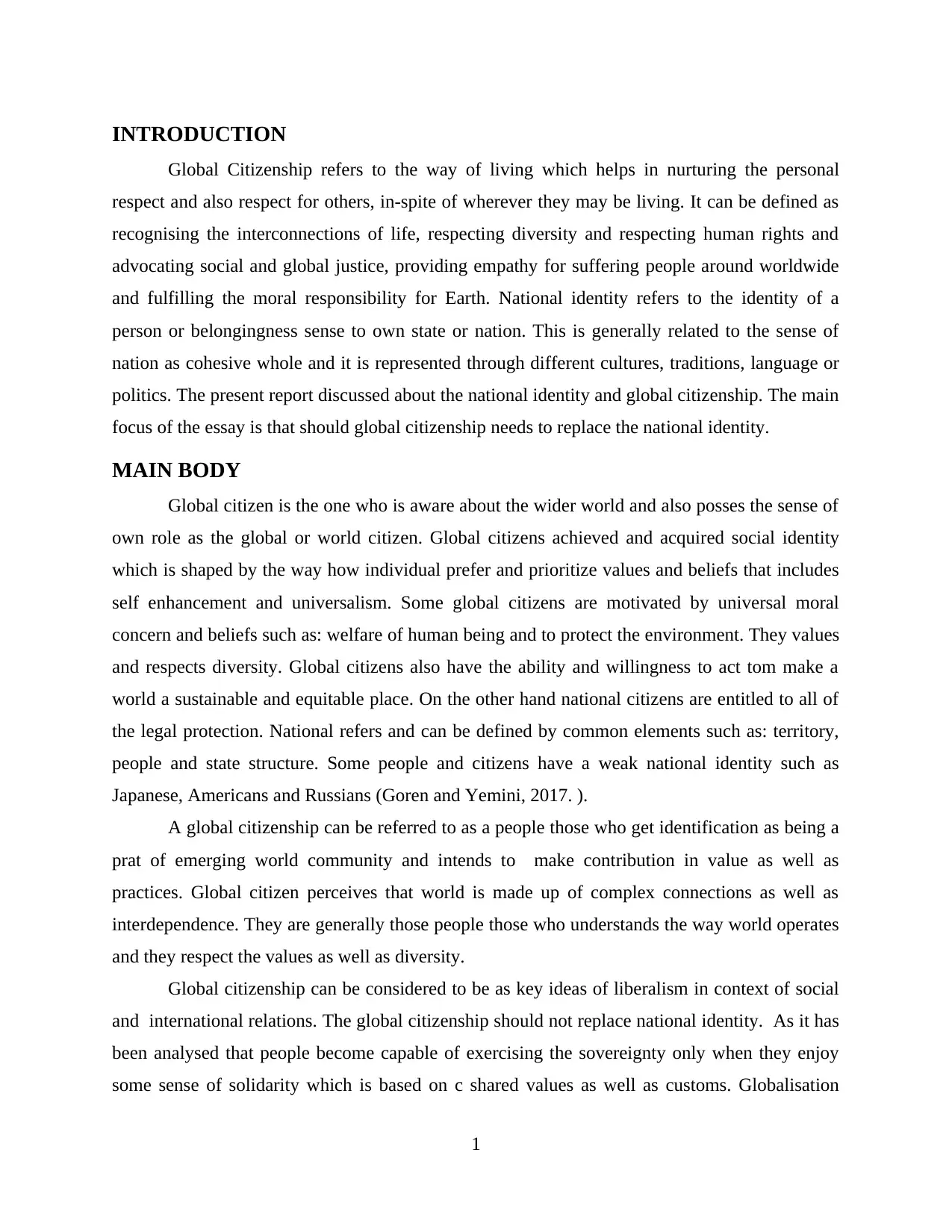
INTRODUCTION
Global Citizenship refers to the way of living which helps in nurturing the personal
respect and also respect for others, in-spite of wherever they may be living. It can be defined as
recognising the interconnections of life, respecting diversity and respecting human rights and
advocating social and global justice, providing empathy for suffering people around worldwide
and fulfilling the moral responsibility for Earth. National identity refers to the identity of a
person or belongingness sense to own state or nation. This is generally related to the sense of
nation as cohesive whole and it is represented through different cultures, traditions, language or
politics. The present report discussed about the national identity and global citizenship. The main
focus of the essay is that should global citizenship needs to replace the national identity.
MAIN BODY
Global citizen is the one who is aware about the wider world and also posses the sense of
own role as the global or world citizen. Global citizens achieved and acquired social identity
which is shaped by the way how individual prefer and prioritize values and beliefs that includes
self enhancement and universalism. Some global citizens are motivated by universal moral
concern and beliefs such as: welfare of human being and to protect the environment. They values
and respects diversity. Global citizens also have the ability and willingness to act tom make a
world a sustainable and equitable place. On the other hand national citizens are entitled to all of
the legal protection. National refers and can be defined by common elements such as: territory,
people and state structure. Some people and citizens have a weak national identity such as
Japanese, Americans and Russians (Goren and Yemini, 2017. ).
A global citizenship can be referred to as a people those who get identification as being a
prat of emerging world community and intends to make contribution in value as well as
practices. Global citizen perceives that world is made up of complex connections as well as
interdependence. They are generally those people those who understands the way world operates
and they respect the values as well as diversity.
Global citizenship can be considered to be as key ideas of liberalism in context of social
and international relations. The global citizenship should not replace national identity. As it has
been analysed that people become capable of exercising the sovereignty only when they enjoy
some sense of solidarity which is based on c shared values as well as customs. Globalisation
1
Global Citizenship refers to the way of living which helps in nurturing the personal
respect and also respect for others, in-spite of wherever they may be living. It can be defined as
recognising the interconnections of life, respecting diversity and respecting human rights and
advocating social and global justice, providing empathy for suffering people around worldwide
and fulfilling the moral responsibility for Earth. National identity refers to the identity of a
person or belongingness sense to own state or nation. This is generally related to the sense of
nation as cohesive whole and it is represented through different cultures, traditions, language or
politics. The present report discussed about the national identity and global citizenship. The main
focus of the essay is that should global citizenship needs to replace the national identity.
MAIN BODY
Global citizen is the one who is aware about the wider world and also posses the sense of
own role as the global or world citizen. Global citizens achieved and acquired social identity
which is shaped by the way how individual prefer and prioritize values and beliefs that includes
self enhancement and universalism. Some global citizens are motivated by universal moral
concern and beliefs such as: welfare of human being and to protect the environment. They values
and respects diversity. Global citizens also have the ability and willingness to act tom make a
world a sustainable and equitable place. On the other hand national citizens are entitled to all of
the legal protection. National refers and can be defined by common elements such as: territory,
people and state structure. Some people and citizens have a weak national identity such as
Japanese, Americans and Russians (Goren and Yemini, 2017. ).
A global citizenship can be referred to as a people those who get identification as being a
prat of emerging world community and intends to make contribution in value as well as
practices. Global citizen perceives that world is made up of complex connections as well as
interdependence. They are generally those people those who understands the way world operates
and they respect the values as well as diversity.
Global citizenship can be considered to be as key ideas of liberalism in context of social
and international relations. The global citizenship should not replace national identity. As it has
been analysed that people become capable of exercising the sovereignty only when they enjoy
some sense of solidarity which is based on c shared values as well as customs. Globalisation
1
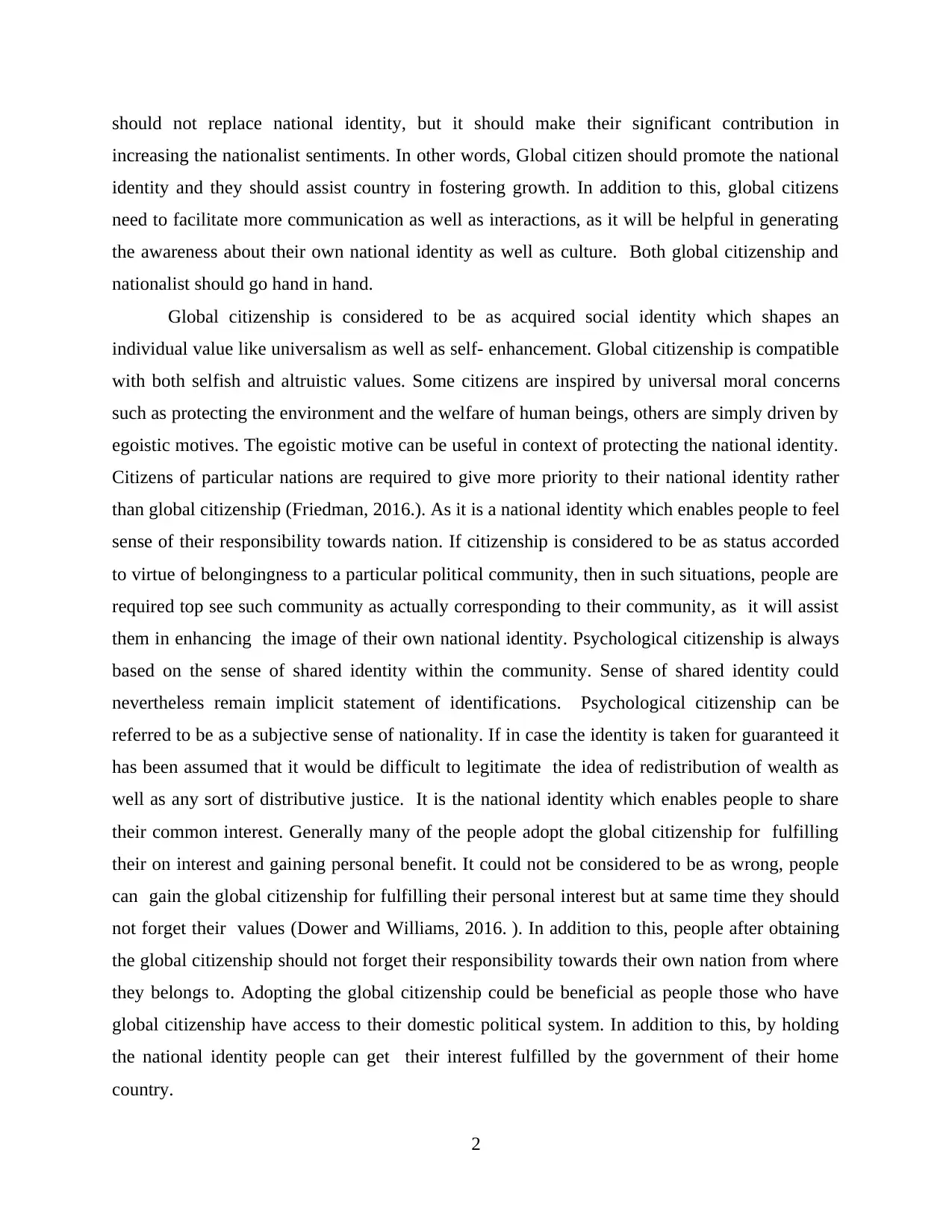
should not replace national identity, but it should make their significant contribution in
increasing the nationalist sentiments. In other words, Global citizen should promote the national
identity and they should assist country in fostering growth. In addition to this, global citizens
need to facilitate more communication as well as interactions, as it will be helpful in generating
the awareness about their own national identity as well as culture. Both global citizenship and
nationalist should go hand in hand.
Global citizenship is considered to be as acquired social identity which shapes an
individual value like universalism as well as self- enhancement. Global citizenship is compatible
with both selfish and altruistic values. Some citizens are inspired by universal moral concerns
such as protecting the environment and the welfare of human beings, others are simply driven by
egoistic motives. The egoistic motive can be useful in context of protecting the national identity.
Citizens of particular nations are required to give more priority to their national identity rather
than global citizenship (Friedman, 2016.). As it is a national identity which enables people to feel
sense of their responsibility towards nation. If citizenship is considered to be as status accorded
to virtue of belongingness to a particular political community, then in such situations, people are
required top see such community as actually corresponding to their community, as it will assist
them in enhancing the image of their own national identity. Psychological citizenship is always
based on the sense of shared identity within the community. Sense of shared identity could
nevertheless remain implicit statement of identifications. Psychological citizenship can be
referred to be as a subjective sense of nationality. If in case the identity is taken for guaranteed it
has been assumed that it would be difficult to legitimate the idea of redistribution of wealth as
well as any sort of distributive justice. It is the national identity which enables people to share
their common interest. Generally many of the people adopt the global citizenship for fulfilling
their on interest and gaining personal benefit. It could not be considered to be as wrong, people
can gain the global citizenship for fulfilling their personal interest but at same time they should
not forget their values (Dower and Williams, 2016. ). In addition to this, people after obtaining
the global citizenship should not forget their responsibility towards their own nation from where
they belongs to. Adopting the global citizenship could be beneficial as people those who have
global citizenship have access to their domestic political system. In addition to this, by holding
the national identity people can get their interest fulfilled by the government of their home
country.
2
increasing the nationalist sentiments. In other words, Global citizen should promote the national
identity and they should assist country in fostering growth. In addition to this, global citizens
need to facilitate more communication as well as interactions, as it will be helpful in generating
the awareness about their own national identity as well as culture. Both global citizenship and
nationalist should go hand in hand.
Global citizenship is considered to be as acquired social identity which shapes an
individual value like universalism as well as self- enhancement. Global citizenship is compatible
with both selfish and altruistic values. Some citizens are inspired by universal moral concerns
such as protecting the environment and the welfare of human beings, others are simply driven by
egoistic motives. The egoistic motive can be useful in context of protecting the national identity.
Citizens of particular nations are required to give more priority to their national identity rather
than global citizenship (Friedman, 2016.). As it is a national identity which enables people to feel
sense of their responsibility towards nation. If citizenship is considered to be as status accorded
to virtue of belongingness to a particular political community, then in such situations, people are
required top see such community as actually corresponding to their community, as it will assist
them in enhancing the image of their own national identity. Psychological citizenship is always
based on the sense of shared identity within the community. Sense of shared identity could
nevertheless remain implicit statement of identifications. Psychological citizenship can be
referred to be as a subjective sense of nationality. If in case the identity is taken for guaranteed it
has been assumed that it would be difficult to legitimate the idea of redistribution of wealth as
well as any sort of distributive justice. It is the national identity which enables people to share
their common interest. Generally many of the people adopt the global citizenship for fulfilling
their on interest and gaining personal benefit. It could not be considered to be as wrong, people
can gain the global citizenship for fulfilling their personal interest but at same time they should
not forget their values (Dower and Williams, 2016. ). In addition to this, people after obtaining
the global citizenship should not forget their responsibility towards their own nation from where
they belongs to. Adopting the global citizenship could be beneficial as people those who have
global citizenship have access to their domestic political system. In addition to this, by holding
the national identity people can get their interest fulfilled by the government of their home
country.
2
Secure Best Marks with AI Grader
Need help grading? Try our AI Grader for instant feedback on your assignments.
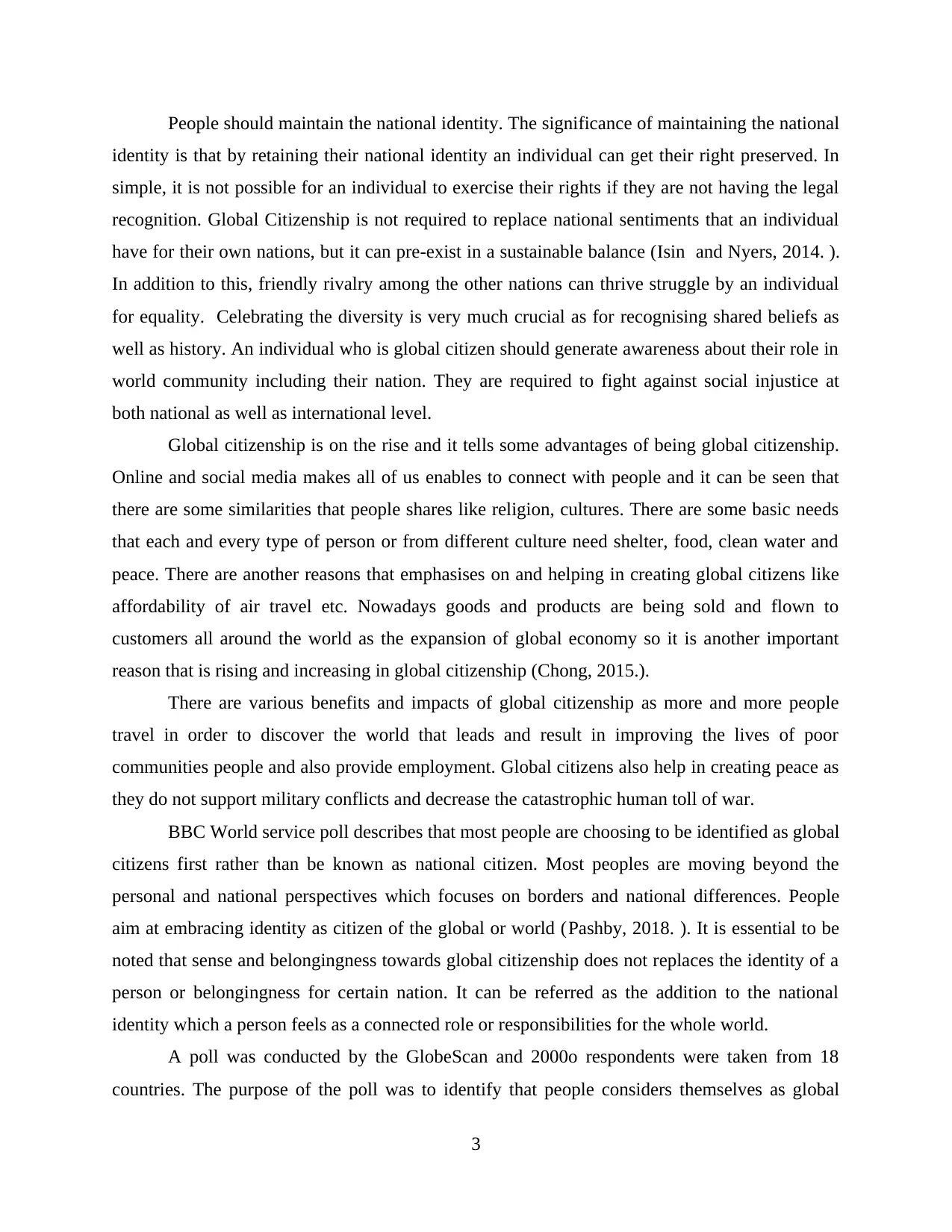
People should maintain the national identity. The significance of maintaining the national
identity is that by retaining their national identity an individual can get their right preserved. In
simple, it is not possible for an individual to exercise their rights if they are not having the legal
recognition. Global Citizenship is not required to replace national sentiments that an individual
have for their own nations, but it can pre-exist in a sustainable balance (Isin and Nyers, 2014. ).
In addition to this, friendly rivalry among the other nations can thrive struggle by an individual
for equality. Celebrating the diversity is very much crucial as for recognising shared beliefs as
well as history. An individual who is global citizen should generate awareness about their role in
world community including their nation. They are required to fight against social injustice at
both national as well as international level.
Global citizenship is on the rise and it tells some advantages of being global citizenship.
Online and social media makes all of us enables to connect with people and it can be seen that
there are some similarities that people shares like religion, cultures. There are some basic needs
that each and every type of person or from different culture need shelter, food, clean water and
peace. There are another reasons that emphasises on and helping in creating global citizens like
affordability of air travel etc. Nowadays goods and products are being sold and flown to
customers all around the world as the expansion of global economy so it is another important
reason that is rising and increasing in global citizenship (Chong, 2015.).
There are various benefits and impacts of global citizenship as more and more people
travel in order to discover the world that leads and result in improving the lives of poor
communities people and also provide employment. Global citizens also help in creating peace as
they do not support military conflicts and decrease the catastrophic human toll of war.
BBC World service poll describes that most people are choosing to be identified as global
citizens first rather than be known as national citizen. Most peoples are moving beyond the
personal and national perspectives which focuses on borders and national differences. People
aim at embracing identity as citizen of the global or world (Pashby, 2018. ). It is essential to be
noted that sense and belongingness towards global citizenship does not replaces the identity of a
person or belongingness for certain nation. It can be referred as the addition to the national
identity which a person feels as a connected role or responsibilities for the whole world.
A poll was conducted by the GlobeScan and 2000o respondents were taken from 18
countries. The purpose of the poll was to identify that people considers themselves as global
3
identity is that by retaining their national identity an individual can get their right preserved. In
simple, it is not possible for an individual to exercise their rights if they are not having the legal
recognition. Global Citizenship is not required to replace national sentiments that an individual
have for their own nations, but it can pre-exist in a sustainable balance (Isin and Nyers, 2014. ).
In addition to this, friendly rivalry among the other nations can thrive struggle by an individual
for equality. Celebrating the diversity is very much crucial as for recognising shared beliefs as
well as history. An individual who is global citizen should generate awareness about their role in
world community including their nation. They are required to fight against social injustice at
both national as well as international level.
Global citizenship is on the rise and it tells some advantages of being global citizenship.
Online and social media makes all of us enables to connect with people and it can be seen that
there are some similarities that people shares like religion, cultures. There are some basic needs
that each and every type of person or from different culture need shelter, food, clean water and
peace. There are another reasons that emphasises on and helping in creating global citizens like
affordability of air travel etc. Nowadays goods and products are being sold and flown to
customers all around the world as the expansion of global economy so it is another important
reason that is rising and increasing in global citizenship (Chong, 2015.).
There are various benefits and impacts of global citizenship as more and more people
travel in order to discover the world that leads and result in improving the lives of poor
communities people and also provide employment. Global citizens also help in creating peace as
they do not support military conflicts and decrease the catastrophic human toll of war.
BBC World service poll describes that most people are choosing to be identified as global
citizens first rather than be known as national citizen. Most peoples are moving beyond the
personal and national perspectives which focuses on borders and national differences. People
aim at embracing identity as citizen of the global or world (Pashby, 2018. ). It is essential to be
noted that sense and belongingness towards global citizenship does not replaces the identity of a
person or belongingness for certain nation. It can be referred as the addition to the national
identity which a person feels as a connected role or responsibilities for the whole world.
A poll was conducted by the GlobeScan and 2000o respondents were taken from 18
countries. The purpose of the poll was to identify that people considers themselves as global
3
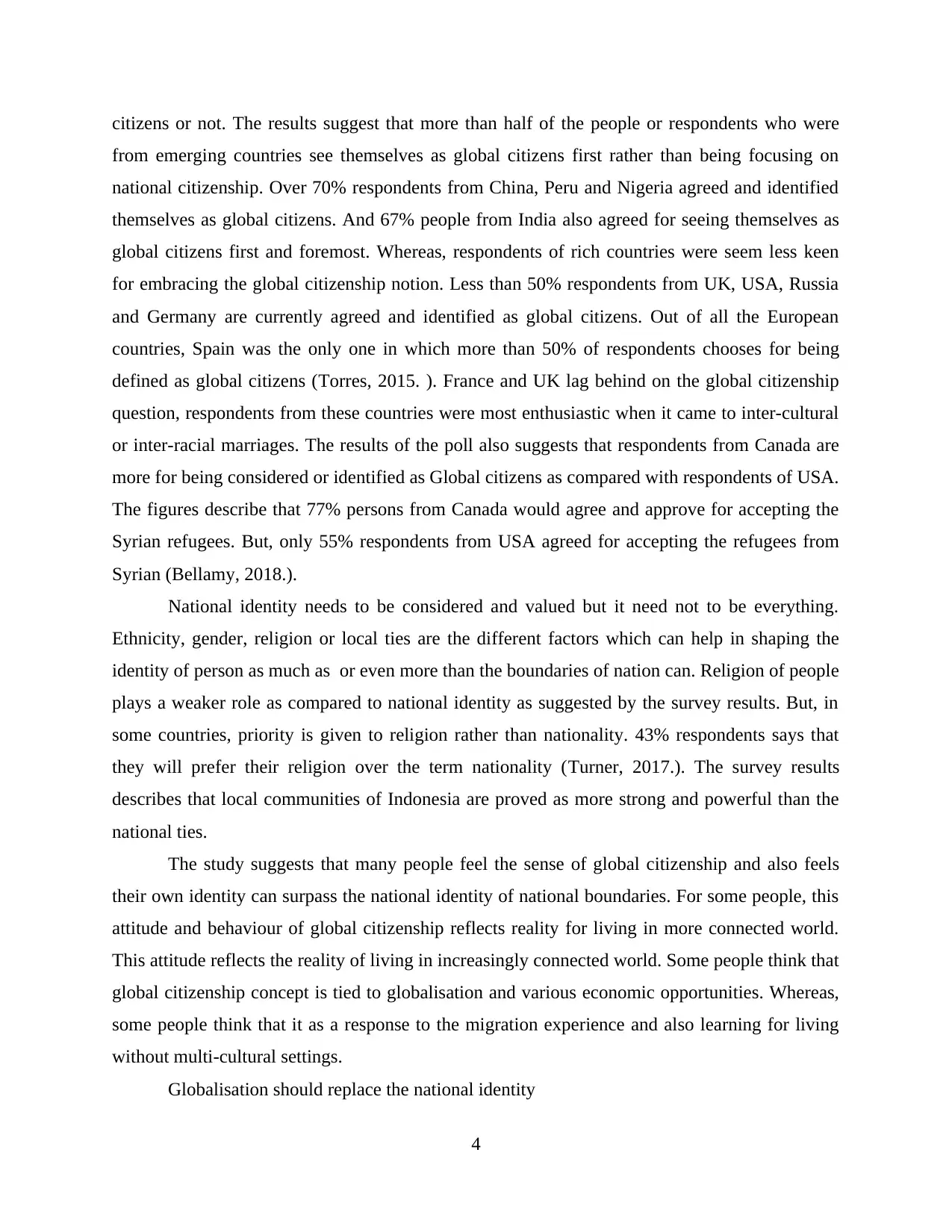
citizens or not. The results suggest that more than half of the people or respondents who were
from emerging countries see themselves as global citizens first rather than being focusing on
national citizenship. Over 70% respondents from China, Peru and Nigeria agreed and identified
themselves as global citizens. And 67% people from India also agreed for seeing themselves as
global citizens first and foremost. Whereas, respondents of rich countries were seem less keen
for embracing the global citizenship notion. Less than 50% respondents from UK, USA, Russia
and Germany are currently agreed and identified as global citizens. Out of all the European
countries, Spain was the only one in which more than 50% of respondents chooses for being
defined as global citizens (Torres, 2015. ). France and UK lag behind on the global citizenship
question, respondents from these countries were most enthusiastic when it came to inter-cultural
or inter-racial marriages. The results of the poll also suggests that respondents from Canada are
more for being considered or identified as Global citizens as compared with respondents of USA.
The figures describe that 77% persons from Canada would agree and approve for accepting the
Syrian refugees. But, only 55% respondents from USA agreed for accepting the refugees from
Syrian (Bellamy, 2018.).
National identity needs to be considered and valued but it need not to be everything.
Ethnicity, gender, religion or local ties are the different factors which can help in shaping the
identity of person as much as or even more than the boundaries of nation can. Religion of people
plays a weaker role as compared to national identity as suggested by the survey results. But, in
some countries, priority is given to religion rather than nationality. 43% respondents says that
they will prefer their religion over the term nationality (Turner, 2017.). The survey results
describes that local communities of Indonesia are proved as more strong and powerful than the
national ties.
The study suggests that many people feel the sense of global citizenship and also feels
their own identity can surpass the national identity of national boundaries. For some people, this
attitude and behaviour of global citizenship reflects reality for living in more connected world.
This attitude reflects the reality of living in increasingly connected world. Some people think that
global citizenship concept is tied to globalisation and various economic opportunities. Whereas,
some people think that it as a response to the migration experience and also learning for living
without multi-cultural settings.
Globalisation should replace the national identity
4
from emerging countries see themselves as global citizens first rather than being focusing on
national citizenship. Over 70% respondents from China, Peru and Nigeria agreed and identified
themselves as global citizens. And 67% people from India also agreed for seeing themselves as
global citizens first and foremost. Whereas, respondents of rich countries were seem less keen
for embracing the global citizenship notion. Less than 50% respondents from UK, USA, Russia
and Germany are currently agreed and identified as global citizens. Out of all the European
countries, Spain was the only one in which more than 50% of respondents chooses for being
defined as global citizens (Torres, 2015. ). France and UK lag behind on the global citizenship
question, respondents from these countries were most enthusiastic when it came to inter-cultural
or inter-racial marriages. The results of the poll also suggests that respondents from Canada are
more for being considered or identified as Global citizens as compared with respondents of USA.
The figures describe that 77% persons from Canada would agree and approve for accepting the
Syrian refugees. But, only 55% respondents from USA agreed for accepting the refugees from
Syrian (Bellamy, 2018.).
National identity needs to be considered and valued but it need not to be everything.
Ethnicity, gender, religion or local ties are the different factors which can help in shaping the
identity of person as much as or even more than the boundaries of nation can. Religion of people
plays a weaker role as compared to national identity as suggested by the survey results. But, in
some countries, priority is given to religion rather than nationality. 43% respondents says that
they will prefer their religion over the term nationality (Turner, 2017.). The survey results
describes that local communities of Indonesia are proved as more strong and powerful than the
national ties.
The study suggests that many people feel the sense of global citizenship and also feels
their own identity can surpass the national identity of national boundaries. For some people, this
attitude and behaviour of global citizenship reflects reality for living in more connected world.
This attitude reflects the reality of living in increasingly connected world. Some people think that
global citizenship concept is tied to globalisation and various economic opportunities. Whereas,
some people think that it as a response to the migration experience and also learning for living
without multi-cultural settings.
Globalisation should replace the national identity
4
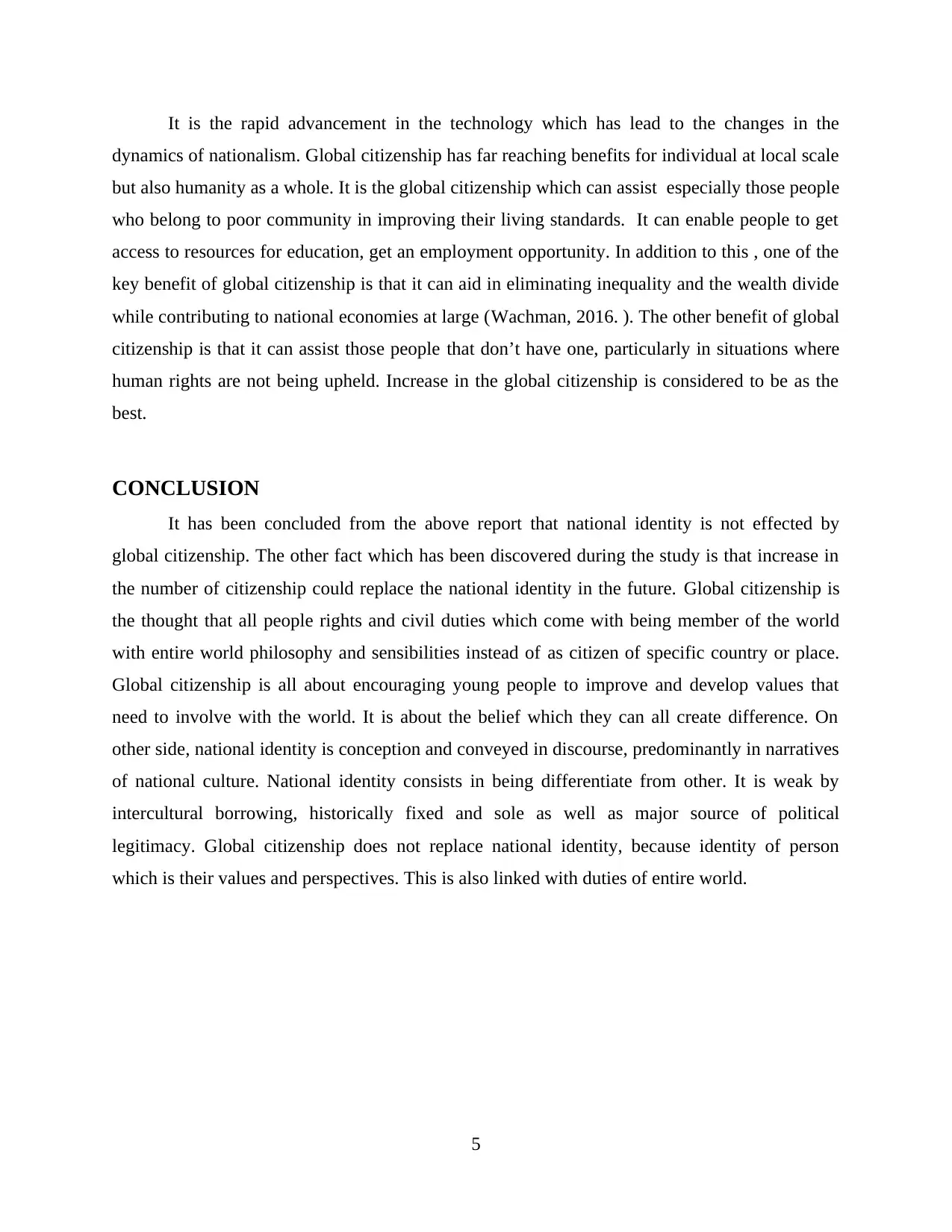
It is the rapid advancement in the technology which has lead to the changes in the
dynamics of nationalism. Global citizenship has far reaching benefits for individual at local scale
but also humanity as a whole. It is the global citizenship which can assist especially those people
who belong to poor community in improving their living standards. It can enable people to get
access to resources for education, get an employment opportunity. In addition to this , one of the
key benefit of global citizenship is that it can aid in eliminating inequality and the wealth divide
while contributing to national economies at large (Wachman, 2016. ). The other benefit of global
citizenship is that it can assist those people that don’t have one, particularly in situations where
human rights are not being upheld. Increase in the global citizenship is considered to be as the
best.
CONCLUSION
It has been concluded from the above report that national identity is not effected by
global citizenship. The other fact which has been discovered during the study is that increase in
the number of citizenship could replace the national identity in the future. Global citizenship is
the thought that all people rights and civil duties which come with being member of the world
with entire world philosophy and sensibilities instead of as citizen of specific country or place.
Global citizenship is all about encouraging young people to improve and develop values that
need to involve with the world. It is about the belief which they can all create difference. On
other side, national identity is conception and conveyed in discourse, predominantly in narratives
of national culture. National identity consists in being differentiate from other. It is weak by
intercultural borrowing, historically fixed and sole as well as major source of political
legitimacy. Global citizenship does not replace national identity, because identity of person
which is their values and perspectives. This is also linked with duties of entire world.
5
dynamics of nationalism. Global citizenship has far reaching benefits for individual at local scale
but also humanity as a whole. It is the global citizenship which can assist especially those people
who belong to poor community in improving their living standards. It can enable people to get
access to resources for education, get an employment opportunity. In addition to this , one of the
key benefit of global citizenship is that it can aid in eliminating inequality and the wealth divide
while contributing to national economies at large (Wachman, 2016. ). The other benefit of global
citizenship is that it can assist those people that don’t have one, particularly in situations where
human rights are not being upheld. Increase in the global citizenship is considered to be as the
best.
CONCLUSION
It has been concluded from the above report that national identity is not effected by
global citizenship. The other fact which has been discovered during the study is that increase in
the number of citizenship could replace the national identity in the future. Global citizenship is
the thought that all people rights and civil duties which come with being member of the world
with entire world philosophy and sensibilities instead of as citizen of specific country or place.
Global citizenship is all about encouraging young people to improve and develop values that
need to involve with the world. It is about the belief which they can all create difference. On
other side, national identity is conception and conveyed in discourse, predominantly in narratives
of national culture. National identity consists in being differentiate from other. It is weak by
intercultural borrowing, historically fixed and sole as well as major source of political
legitimacy. Global citizenship does not replace national identity, because identity of person
which is their values and perspectives. This is also linked with duties of entire world.
5
Paraphrase This Document
Need a fresh take? Get an instant paraphrase of this document with our AI Paraphraser
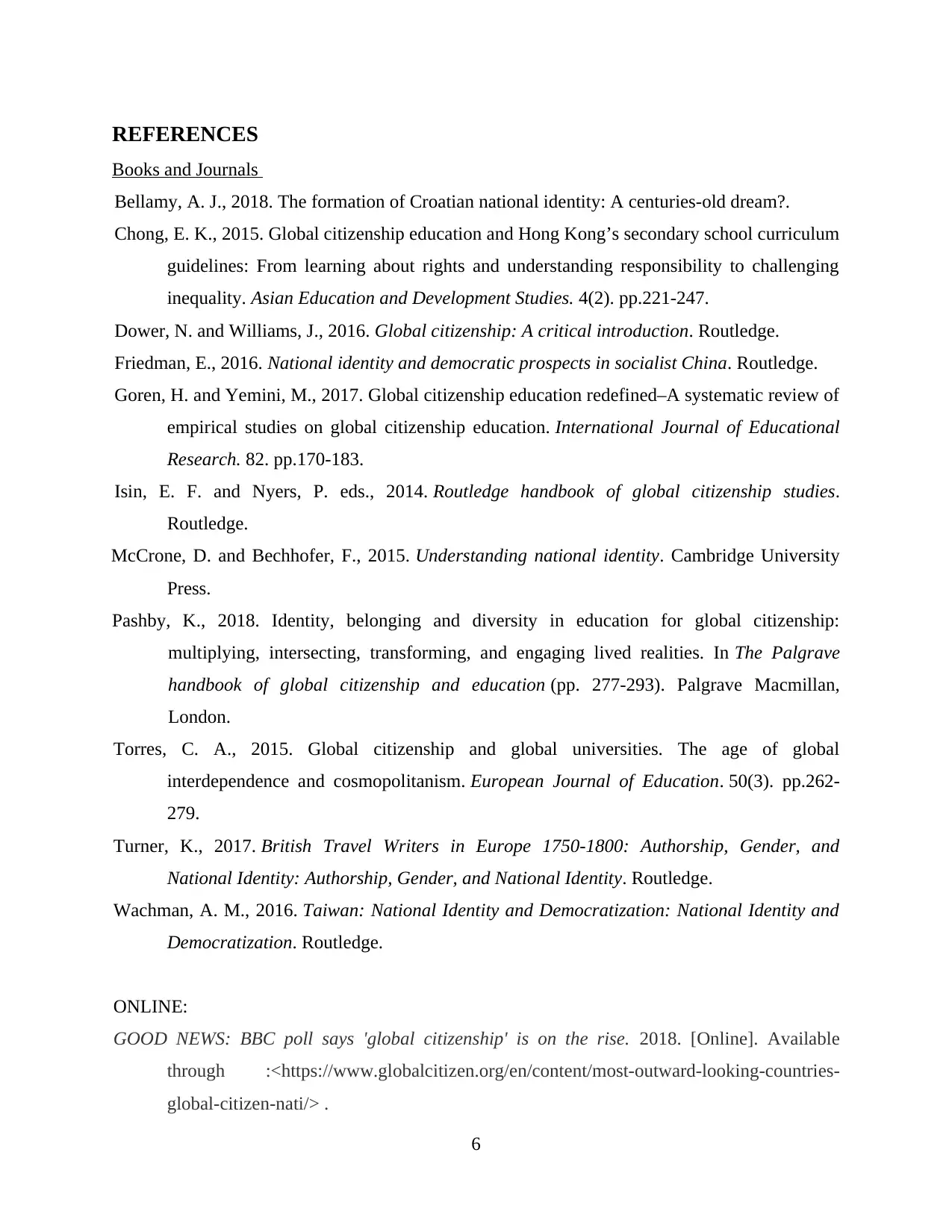
REFERENCES
Books and Journals
Bellamy, A. J., 2018. The formation of Croatian national identity: A centuries-old dream?.
Chong, E. K., 2015. Global citizenship education and Hong Kong’s secondary school curriculum
guidelines: From learning about rights and understanding responsibility to challenging
inequality. Asian Education and Development Studies. 4(2). pp.221-247.
Dower, N. and Williams, J., 2016. Global citizenship: A critical introduction. Routledge.
Friedman, E., 2016. National identity and democratic prospects in socialist China. Routledge.
Goren, H. and Yemini, M., 2017. Global citizenship education redefined–A systematic review of
empirical studies on global citizenship education. International Journal of Educational
Research. 82. pp.170-183.
Isin, E. F. and Nyers, P. eds., 2014. Routledge handbook of global citizenship studies.
Routledge.
McCrone, D. and Bechhofer, F., 2015. Understanding national identity. Cambridge University
Press.
Pashby, K., 2018. Identity, belonging and diversity in education for global citizenship:
multiplying, intersecting, transforming, and engaging lived realities. In The Palgrave
handbook of global citizenship and education (pp. 277-293). Palgrave Macmillan,
London.
Torres, C. A., 2015. Global citizenship and global universities. The age of global
interdependence and cosmopolitanism. European Journal of Education. 50(3). pp.262-
279.
Turner, K., 2017. British Travel Writers in Europe 1750-1800: Authorship, Gender, and
National Identity: Authorship, Gender, and National Identity. Routledge.
Wachman, A. M., 2016. Taiwan: National Identity and Democratization: National Identity and
Democratization. Routledge.
ONLINE:
GOOD NEWS: BBC poll says 'global citizenship' is on the rise. 2018. [Online]. Available
through :<https://www.globalcitizen.org/en/content/most-outward-looking-countries-
global-citizen-nati/> .
6
Books and Journals
Bellamy, A. J., 2018. The formation of Croatian national identity: A centuries-old dream?.
Chong, E. K., 2015. Global citizenship education and Hong Kong’s secondary school curriculum
guidelines: From learning about rights and understanding responsibility to challenging
inequality. Asian Education and Development Studies. 4(2). pp.221-247.
Dower, N. and Williams, J., 2016. Global citizenship: A critical introduction. Routledge.
Friedman, E., 2016. National identity and democratic prospects in socialist China. Routledge.
Goren, H. and Yemini, M., 2017. Global citizenship education redefined–A systematic review of
empirical studies on global citizenship education. International Journal of Educational
Research. 82. pp.170-183.
Isin, E. F. and Nyers, P. eds., 2014. Routledge handbook of global citizenship studies.
Routledge.
McCrone, D. and Bechhofer, F., 2015. Understanding national identity. Cambridge University
Press.
Pashby, K., 2018. Identity, belonging and diversity in education for global citizenship:
multiplying, intersecting, transforming, and engaging lived realities. In The Palgrave
handbook of global citizenship and education (pp. 277-293). Palgrave Macmillan,
London.
Torres, C. A., 2015. Global citizenship and global universities. The age of global
interdependence and cosmopolitanism. European Journal of Education. 50(3). pp.262-
279.
Turner, K., 2017. British Travel Writers in Europe 1750-1800: Authorship, Gender, and
National Identity: Authorship, Gender, and National Identity. Routledge.
Wachman, A. M., 2016. Taiwan: National Identity and Democratization: National Identity and
Democratization. Routledge.
ONLINE:
GOOD NEWS: BBC poll says 'global citizenship' is on the rise. 2018. [Online]. Available
through :<https://www.globalcitizen.org/en/content/most-outward-looking-countries-
global-citizen-nati/> .
6

7
1 out of 9
Related Documents
Your All-in-One AI-Powered Toolkit for Academic Success.
+13062052269
info@desklib.com
Available 24*7 on WhatsApp / Email
![[object Object]](/_next/static/media/star-bottom.7253800d.svg)
Unlock your academic potential
© 2024 | Zucol Services PVT LTD | All rights reserved.





